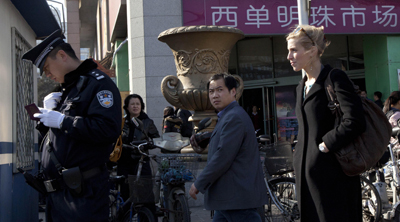Working to defend press freedom, I take it that I’ve hit the mark when I get censored. So I smiled today when I got an e-mail from a friend in China who said he was in the gym watching breakfast television when my face came up on CNN. I opened my mouth and the screen went blank. Chinese censors are nothing if not quick.
It’s not unusual for international channels like CNN and the BBC to go dark in China when those with their hand on the switch in some Orwellian master control room hear words like “Tibet,” “Falun Gong,” or “Tiananmen Square.” But now there’s a new square that really seems to have rattled the ruling Communist elite–Tahrir Square. The protests in Cairo and across the Middle East have touched a nerve in Beijing, where authorities, ever-mindful of the Tiananmen turmoil two decades ago, want to nip any dissent in the bud.
Anonymous calls on overseas websites in the past few weeks for people in Beijing and Shanghai to protest in the guise of Sunday afternoon “strolls” have gone largely unheeded except for the foreign press. Reporters who turned up to cover these “events” have been detained, attacked, and harassed with a ferocity not seen since before the 2008 Olympics. The onslaught has reversed the relaxation of reporting restrictions Beijing introduced ahead of the Games, which were billed as a showcase for the new China.
The depth of official unease over possible dissent was evident when Foreign Minister Yang Jiechi outright denied that police had attacked the press at these “strolling protests” despite video recordings of them doing just that. One reporter was even hospitalized after a beating.
I said all this on CNN but viewers in China never got to hear it. The censors achieve at least one thing: They allow the government to remain in its state of deep denial.
